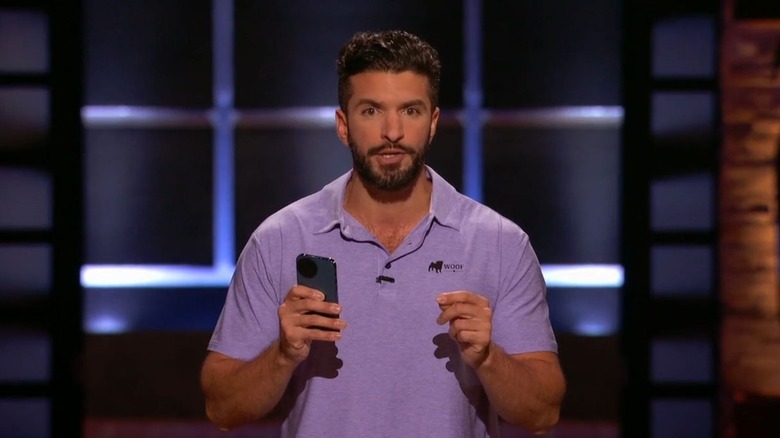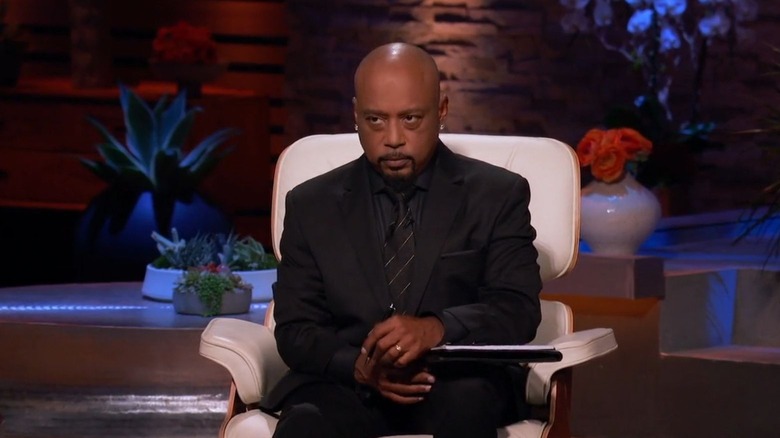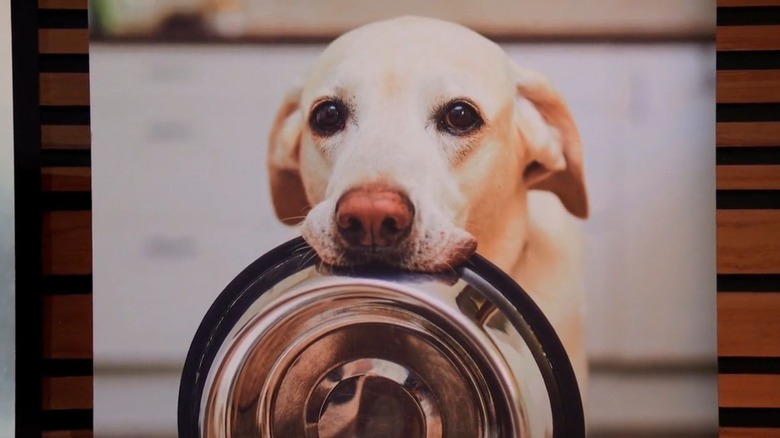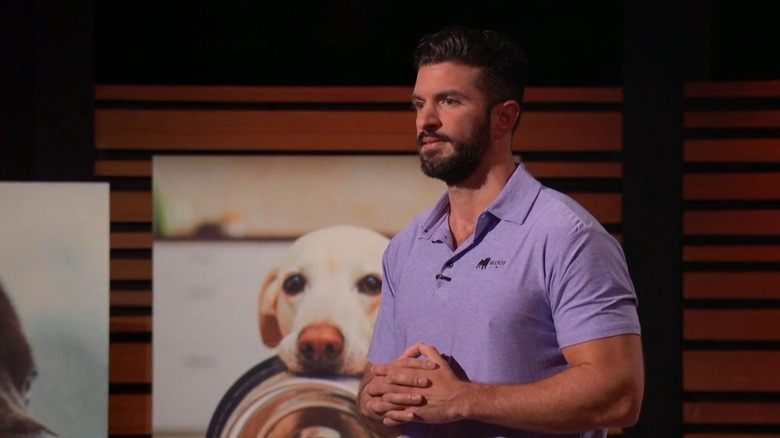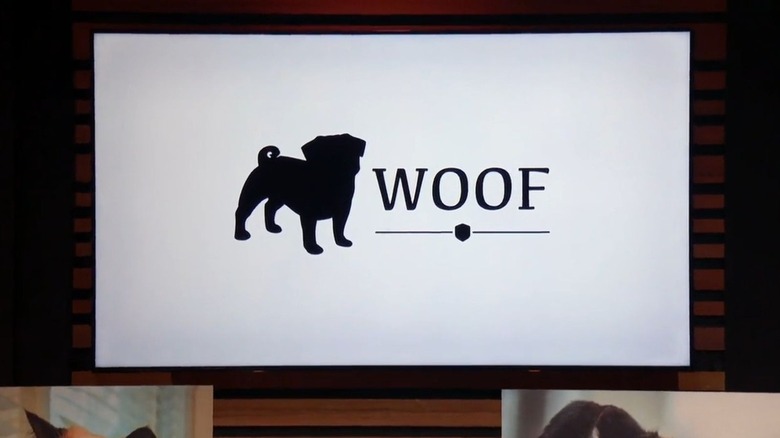Whatever Happened To The Woof App After Shark Tank?
Who takes care of your pets when you can't?
That was exactly what entrepreneur Arsy Khodabandelou thought after he almost found himself in a nasty car accident. "Rather than my life flashing before my eyes," he recalled in 2023, "my dogs' lives flashed before my eyes." If Khodabandelou had found himself suddenly confined to a hospital bed — potentially unconscious and unable to communicate — he would have no way of ensuring that his beloved pets would be taken care of. Even if he could contact his immediate family, he lives in a different state (like many adults in the modern era).
To solve this problem, Khodabandelou began developing a service called "Woof." Its purpose is to give pet owners some peace of mind that — should the unthinkable happen — someone else will be thinking of their furry companions at home. With a problem-solving idea under his belt, Khodabandelou nabbed a spot on ABC's reality investing program "Shark Tank," where he got to test the waters with his animal-safety service. Sadly, those finned financiers would prove far less friendly than the sweet pups that inspired this endeavor in the first place.
Woof left the Shark Tank with a whimper
When Arsy Khodabandelou entered the "Shark Tank," the Woof app operated relatively simply. Upon leaving their homes, pet parents could set a timer (seemingly from one to 24 hours, per the rudimentary display seen on the show) that would tell the app how long their fur baby would be alone. If that timer ran out without a response from the parent, Woof would then call that parent's emergency contact — and if that didn't work, they would call local authorities to initiate a wellness check on the home.
When Khodabandelou appeared on "Shark Tank," Woof had only been active for about three months, with him seemingly operating the service entirely on his own. He claims his operating costs were under $100 per month, though that would change as his business scaled beyond 5,000 users. To make that happen, he was seeking a $100,000 investment in exchange for 10% of the business — an arguably generous valuation of $1 million, considering less than 200 people were paying for the service at the time. As of recording, the service cost $2.99 per month or $29.99 per year.
Unfortunately for the would-be pet savior, the sharks couldn't wrap their heads around how Khodabandelou's idea would become a profitable business. Daymond John was the first to swim away, noting an obvious but devastating fact — "Woof" is a pretty much un-trademarkable name. Everyone else quickly followed suit, sending Khodabandelou out of the Tank with his tail between his legs.
Without a deal, Woof couldn't make a splash
Normally, a business that appears on "Shark Tank" can take advantage of something known as the "Shark Tank" Effect, which can be described as entrepreneurs using the show as free advertising whether they successfully land a deal or not (in fact, some entrepreneurs — referred to as "Gold Diggers" by the sharks — go on the show just for the exposure, without any serious interest in a deal). But Woof is rather unique in that it received very little coverage after its appearance on the show.
Shortly before the episode aired in March 2023, a Baltimore news station did a smaller human interest piece on Arsy Khodabandelou as a local entrepreneur making the big time (though, as he says on "Shark Tank," Khodabandelou had already moved to New York by the time his episode was taped). Afterward, writer, business strategist, and educator Joe Pardo reviewed Khodabandelou's pitch on his YouTube channel, where he regularly provides live commentary on "Shark Tank" pitches.
For what it's worth, Pardo felt the Woof app was easily scaleable but was dubious as to whether or not the service was all that necessary — especially considering Woof couldn't send one of their (nonexistent) employees to personally help or provide any other service for a pet (such as walking them or letting them outside to relieve themselves). In short, Woof's biggest strength and weakness was that it's essentially a concierge service with the end goal of calling the police.
Despite its tepid reception, Woof is still wagging along
Even after failing to land a "Shark Tank" partnership (or at least make enough of an impression to get some media coverage), Woof still seems to be in business. That admittedly isn't terribly shocking, given how low Arsy Khodabandelou's operating costs likely still are. He only has a few hundred likes on Facebook and a little over 1,000 followers on Instagram, which means he probably hasn't yet hit the 5,000-user threshold that would necessitate hiring employees or contracting a call center in order for Woof to work. In other words, it ironically may have benefitted Khodabandelou that his business didn't benefit from the "Shark Tank" Effect, as he can continue running Woof for $100 a month for as long as he's able or interested.
And that's a great thing because Woof's customer base — small as it may be — loves the service it provides. On the Apple App Store, Woof — Pet Safety has 4.7 stars out of 5, based on a respectable 39 reviews, most of which are full of effusive praise. The few negative reviews cite some clunky app functionality and occasional system crashes. However, the consensus appears to be that Woof provides a necessary service that gives pet parents the peace of mind Khodabandelou hoped it would.
For now, Woof is still a part-time job for Arsy Khodabandelou
As of writing, Arsy Khodabandelou has not yet made Woof his full-time job, currently working as a Sales Team Lead for a medical supply company in New York. If he has aspirations for Woof beyond a helpful side project (which is already impressive in and of itself), he would need to find a way to scale his user base to a point where subscription revenue can fund both his salary and the salaries of his eventual employees. It's an obvious next step that's far easier said than done, especially in the case of an app like Woof. This is precisely why most of the "Shark Tank" investors chose not to get involved.
One of Woof's subtler strengths is its small yet passionate customer base. Khodabandelou could lean on that to help expand the business, perhaps through something as simple as a referral program that benefits new users and older users who introduced them to the app. After all, these pet parents likely wouldn't need much motivation to share this potentially life-saving service with their loved ones.
However, this won't solve the app's main drawback of only acting as an intermediary between you and your emergency contacts (and eventually the police). In a perfect world, Woof would likely be best served by getting acquired by a large pet hospitality chain that could enlist its workforce to perform these check-ins instead. They'd be more equipped to care for the animals than the police and could operate out of the brick-and-mortar stores already in place (rather than requiring Woof to build out its own network for such a niche service).
